2024: a year in review

Since I don't have a boss, you be the judge of me :) I wanted to review 2024, and what better way to do so than by sharing my highs and lows of the past year with the world 🚀
For me, 2024 was all about building distribution. After the VC incubator program I did mid-2023, I realised that even the best product ever will fall flat without proper distribution and marketing.
This personal blog was the first step in a journey across the 2024 internet that has seen me launch a YouTube channel, run SEO and programmatic SEO experiments, create digital products, take online courses, and attend a host of conferences.
All to help build my "personal brand" – more on that below.
Let's start with the highs.
The highs
- Youtube-monetized through AI coding

As can be seen above, my Youtube channel really took off after taking a course with the wonderful Gabe Bult in the summer of 2024 (The 5-hour YouTuber, highly recommended!). I also happened to get insanely lucky with the timing of one of my videos. I thought I missed the boat on this video since I'd originally planned to record it sooner, but turns out the week after publishing it the topic of AI coding with Cursor blew up all over the internet. Lucky timing (and showing up).
That one video took around 7 hours to make and has been watched almost 90.000 times in 2024, for a grand total of 4.733 hours to date.
This is the video in question:
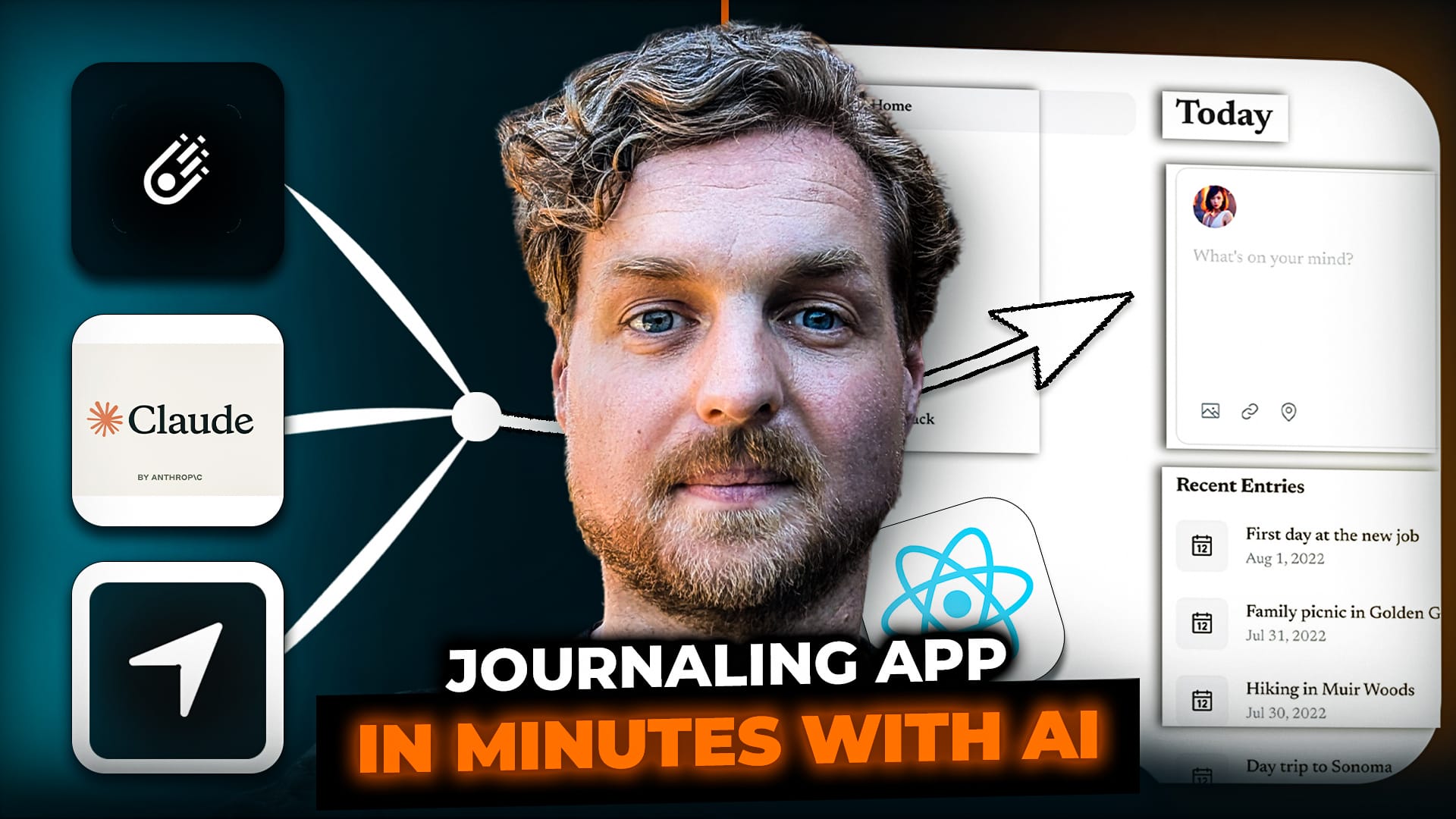
It also helped that I had a couple of months of experience working with Cursor when the rest of the internet was just discovering this wonderful AI tool, so I knew I had something valuable to share.
As far as I can tell, the breakaway success of this video was a combination of the right content & packaging at the right time, and I haven't been able to replicate its performance with the next couple of videos (more on this below).
It has still done wonders for my channel, which as of this writing has 3,190 subscribers and yesterday had people tuning in to my content for 5.28 hours.
Talk about time leverage.
- SEO spark: 7 AFATTs
The other outlier in terms of content performance this year was a surprise to me – a post I wrote for this blog:
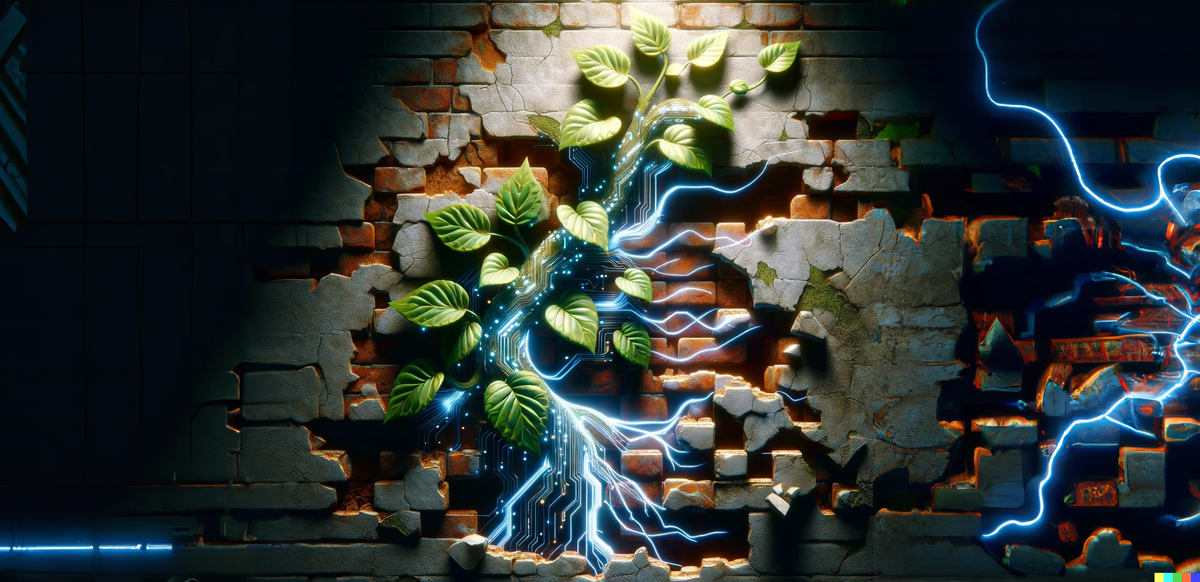
I knew it was an inspired idea, and research at the time of writing showed there was no content covering this question anywhere online. Given that it combined my interests in philosophy and marketing it was also a no-brainer (and fun!) to write.
Below is the SEO performance over 2024:


Google search console data for www.denominations.io. Most organic SEO traffic is from "facts about truth" queries.
As you can see, most of the organic search impressions and clicks on here are from "facts about truth" Google queries – which apparently is a question more people than I expected ask themselves (and Google).
Here is the full Google Analytics data for www.denominations.io over 2024:
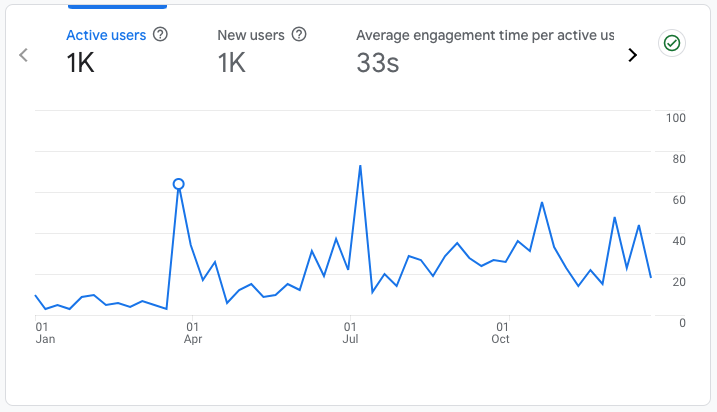
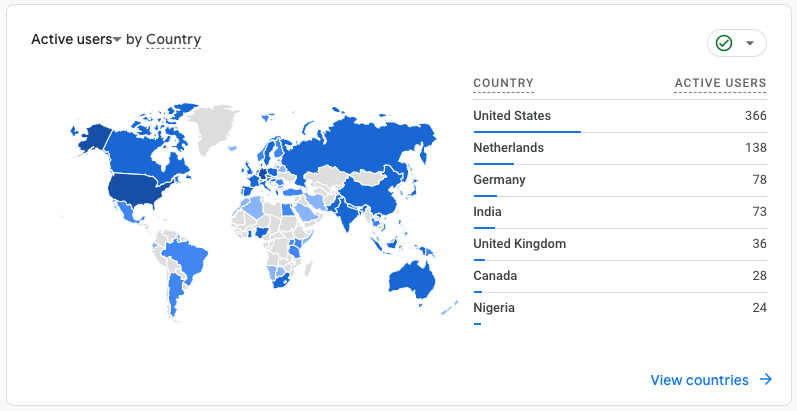
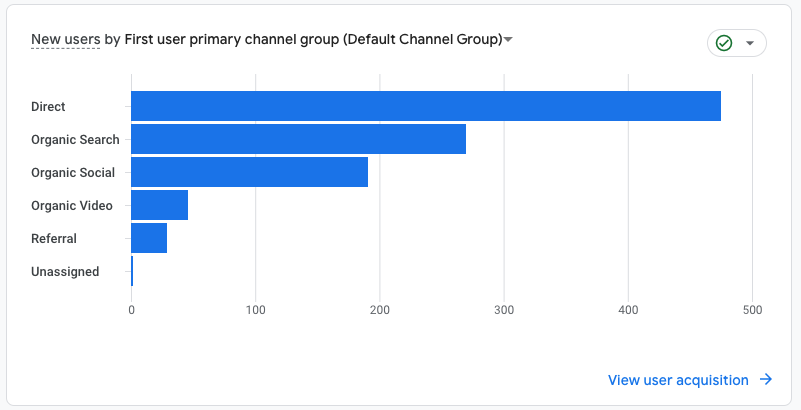
2024 Google Analytics data for www.denominations.io.
Given that I had zero performance goals or expectations for this personal blog, this was a nice surprise. As with the Youtube video discussed above, I haven't been able to successfully follow up on the "facts about truth" post because I got side-tracked on other things.
- MicroConf Europe 2024, Croatia
After attending a slew of conferences online it was a really nice to attend one in person again – and traveling to Dubrovnik in October made it all the more pleasant!
What's there to share? I have never felt more at ease outside the comfort of my home than at Microconf. This is a conference and community of bootstrapped entrepreneurs–of self-made founders running SaaS products and agencies, with the vast majority of them having solid experience in both tech and business.
I was among the 25% of conference attendees pre-revenue, with on the other end of the scale 25% of attendees doing more than USD 1M in ARR (annual run rate) with their companies.
I learnt a ton from talking to other entrepreneurs, and wrote this post as a distillation of my key takeaways from those talks and the conference track:
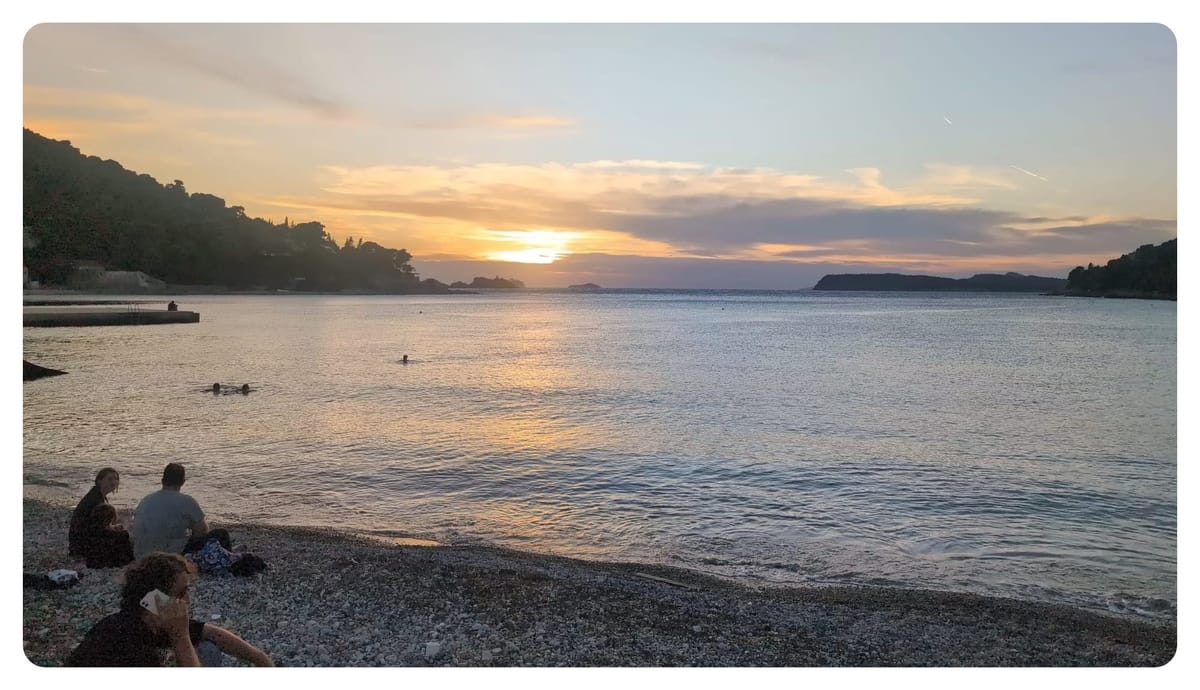
- AIgrunn November 2024 conference talk
One side effect of having a Youtube video blow up – besides mails with influencer sponsorship opportunities and the fact that I got my Youtube channel monetised – is that one of the organisers of AIgrunn reached out to me to ask if I'd be interested in speaking at their conference.
I hesitated at first, but after coming up with a talk and topic during one of my daily walks I ended up submitting an RFP.
The RFP got accepted, and I had a blast attending the speaker dinner!
It was really great to talk to colleagues in my field again, after more than a year of working remote. This is the recording of the talk, which is already one of the most viewed ever on the AIgrunn & Pygrunn Youtube channel:
Many thanks also to the technician that managed to duck-tape together a bunch of connectors last minute to make sure my 2017 laptop could beam the slides!
The lows
- Medium performance on Medium
Starting out end of 2023, my main strategy for becoming a better online writer was to test the performance of my writing on Medium audiences. I had some success publishing on Medium back in 2019, when the two posts I wrote got picked up by the Towards Data Science and The Startup publications resulting in 1000-2000 reads per article over the span of a couple of months.
These are my stats on the platform for December:
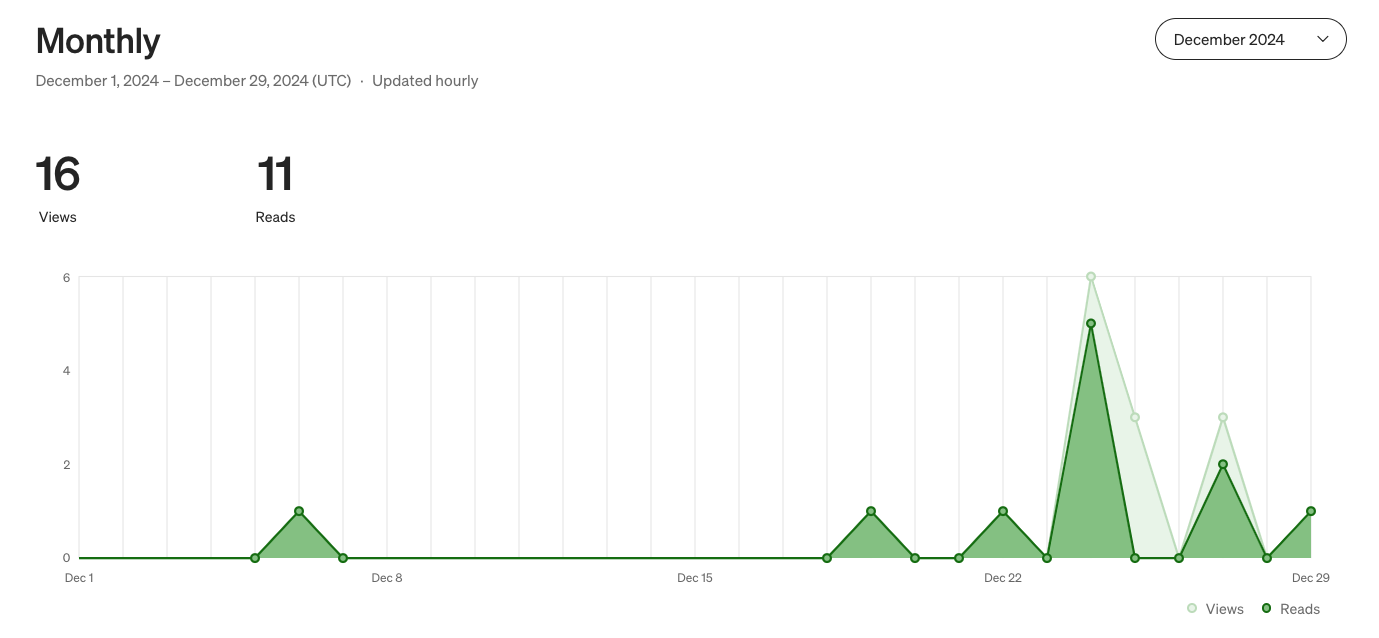
And December 2024 was a relatively good month.
So not exactly what I hoped for, and I'll probably delete my Medium account soon. A couple of things I did wrong with the Medium reboot:
- I deleted my old Medium account since I wanted to create and curate my own Medium publication ("denominations"), which meant I lost all the clout and audience from my 2019 articles. Sheer arrogance in hindsight.
- I ignored the one thing that got me reach in 2019: being featured in Medium publications as a new writer / account.
- I just crossposted from my personal blog without looking at what worked on Medium. To succeed on Medium you need to write for Medium audiences. The one article I wrote specifically for Medium also got the most "claps" (likes in Medium lingo).
- I underestimated how crowded Medium has gotten since the pandemic. It's seen a surge of new writers during 2020-2021 that specialise in producing Medium content. I'm not the only one who's noticed this, but Medium as a social media platform has probably reached the maturity stage in the social media platform lifecycle.
- Gumroad ebook X Ads campaign
For several months in 2024 I worked on an idea for an AI app that would help its users master AI tools faster. I'd gotten the idea at a conference where people where offering EUR 800 pp 4-hour workshops on "ChatGPT". I figured I could do better by building AI tutors to help users work on their prompting skills (and offer it at EUR 10/m – or EUR 10 in prepaid credits).
Before building the app I decided to validate the idea by generating a prompt engineering cookbook with GPT-4o when GPT-4o was first released back in May 2024. Within two days after the GPT-4o release (because I also have a real job) I had a prompt engineering guide generated mostly with GPT-4o.
To run the validation at scale and investigate willingness to pay I decided to buy Twitter ads directed to a Gumroad page where people could buy the ebook.
Here are the results:
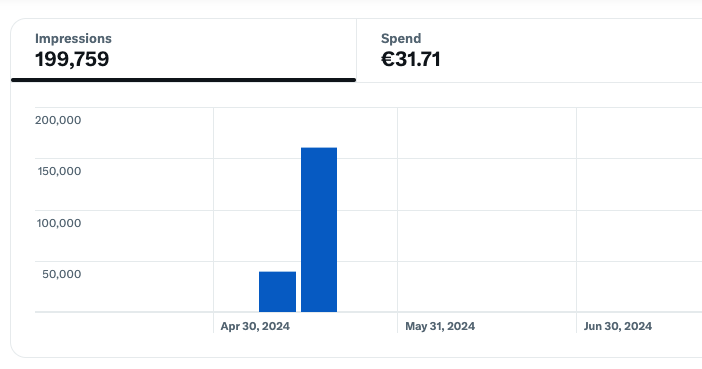
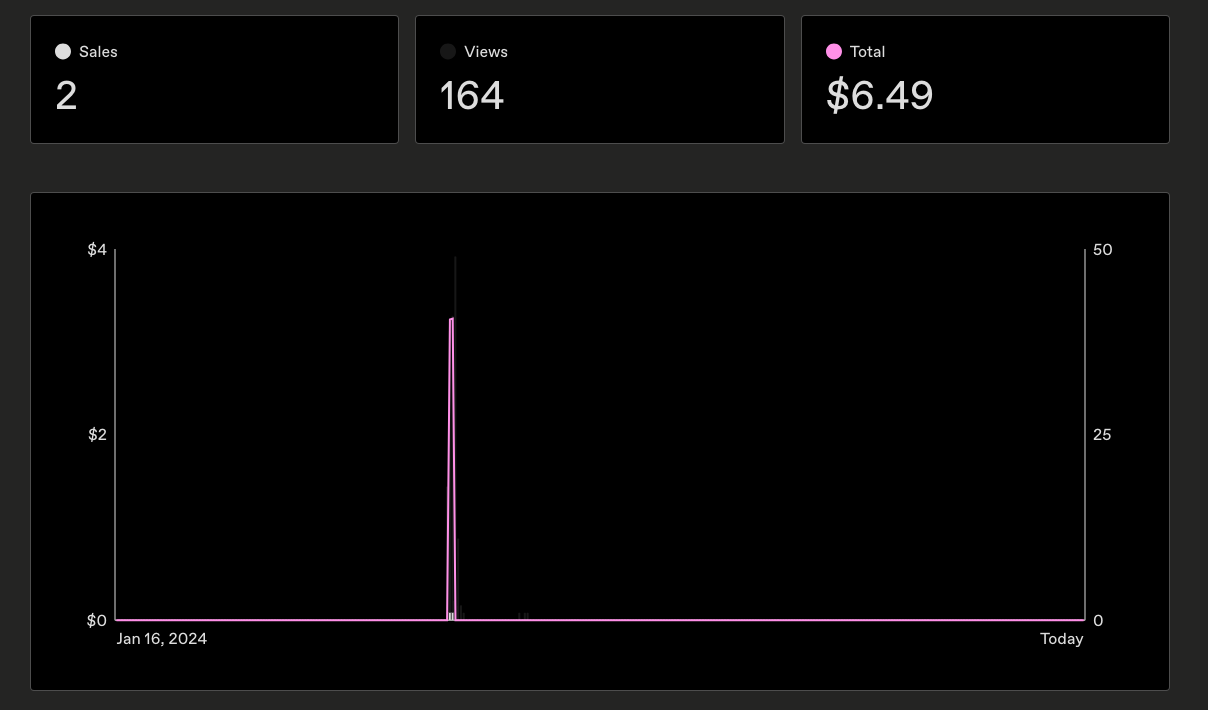
In all, I spent EUR 32 on ads to generate USD 6.49 in sales. 200.000 impressions on X drove 220 link clicks (~0.11%). Not a great ROI, especially if you take into account that it also cost me roughly 4 hours to set everything up (most of which was spent formatting the first version of the ebook manually).
This is the prompt writing ebook, in case you're interested:
What is worse, I should have stopped it at that but I went on and got the ebook formatted on Fiverr for EUR 44 and set up a landing page on Hubspot for the AI from scratch idea (another EUR 24 and 10 hours of work).
- Programmatic SEO experiments for AI from scratch
Partly because I didn't have any other digital products lined up, and partly because I believed helping people boost their AI literacy skills would be the best use of my time, I refused to give up just because the willingness to pay wasn't there (wrong move, but hey I'm learning).
I figured I was just early to the market, a market that thinks AI = ChatGPT. So I decided to see if I could build awareness for AI from scratch (my AI prompting tutor app) using programmatic SEO (Search Engine Optimisation).
Now I didn't know the first thing about SEO going into this, and to be honest I still don't. I did buy a course on SEO, which I still need to do. That being said, this is roughly what I ended up doing based on Youtube videos from SEO experts:
- Keyword research with Google Ads keyword planner and Claude.
- Generate a host of blogs based on those keywords with AI (LangChain agents).
- Upload and correct the blogposts manually to "humanize" them.
I picked AI & ML as blogpost topics so I'd have to spend less time factchecking, since I could use my 10 years of experience as an ML engineer.
These are the results of my programmatic SEO experiment:
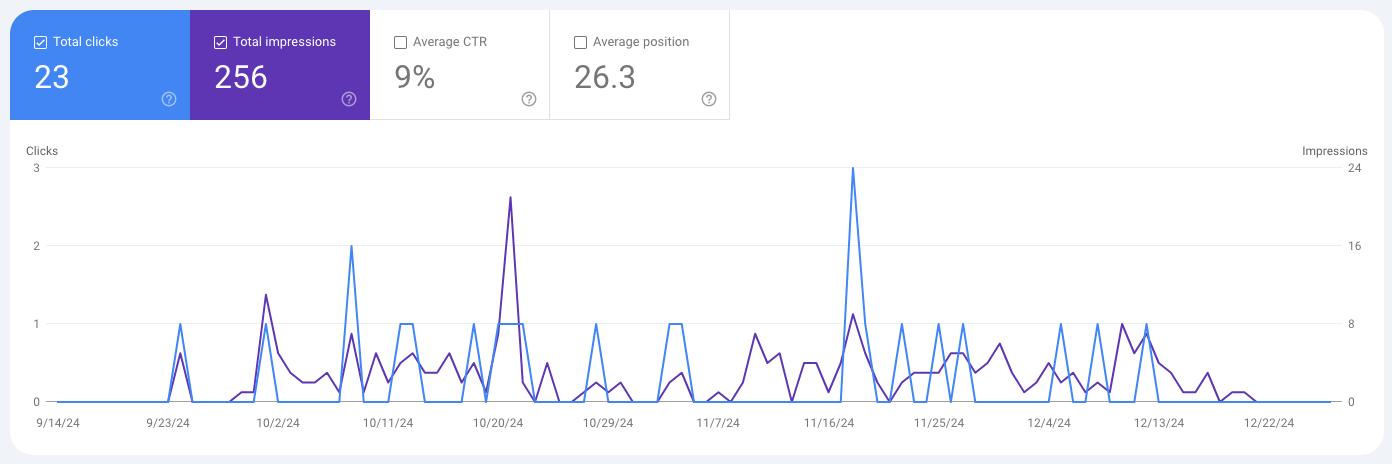
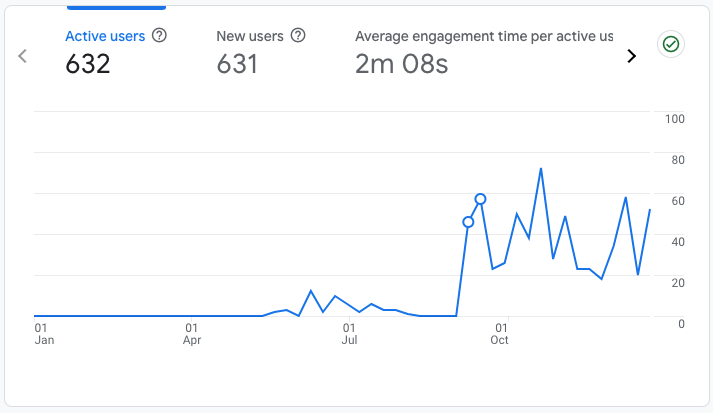
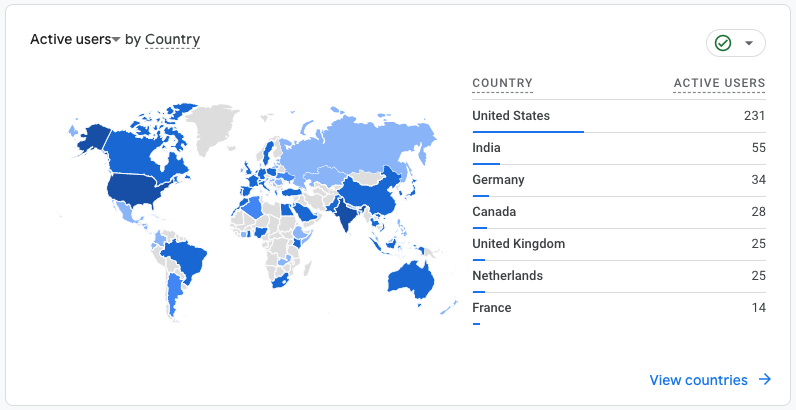
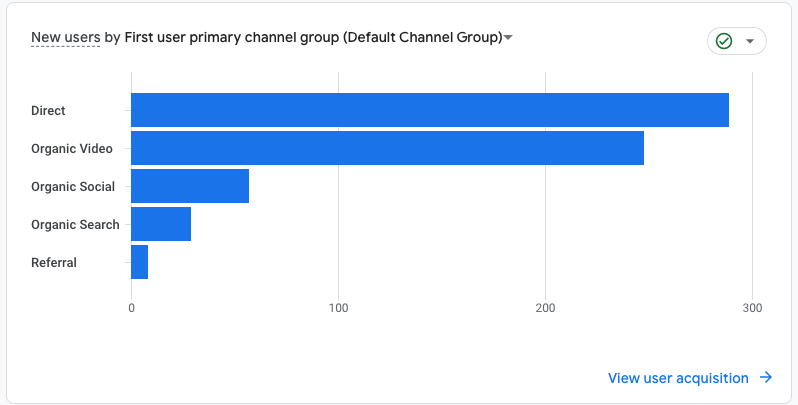
AI from scratch analytics for 2024 (combined from Google Search Console and Google Analytics)
As you can see, the programmatic SEO results were a lot worse than for my personal blog, where I hadn't intended to drive any traffic to!
I ended up using the AI from scratch app to also host the blogposts accompanying my Youtube videos, so the stats are far more flattering than the results of the pSEO experiment. It's something like 9 clicks for the programmatic SEO content to date.
- AI coding overconfidence
And what is worse – perhaps my biggest loss of the year – was that building the React app for AI from scratch and integrating an open source CMS (Content Management System, I used Payload CMS) took way longer than expected.

I started this build because I'd just downloaded Cursor IDE and the combination of Cursor and Claude 3.5 Sonnet sped up my frontend development enormously. This made me overconfident in my ability to do frontend work (and underestimate the amount of time it would actually take).
Even though these two tools were a big help, the whole React app build (without the AI tutors, which I never got round to building) took almost 5 days – 40 hours I could have also spent actually making money.
The switch to Payload CMS was partly driven by my experiences with Hubspot, which was both expensive (EUR 24/m for the starter plan) and un-automatable. That meant I couldn't easily do programmatic SEO at scale, because each blogpost would need to be formatted and uploaded manually.
I also wanted to tightly integrate the content with agentic AI tutors in learning paths for the paid version of AI from scratch, so I really didn't have a choice but to have full control over my CMS. Either way, I now have the skills, infrastructure and app templates available to integrate CMS systems into React apps so it's not a complete loss (plus I got to enjoy Payload's "hold my beer" CEO content).
Lessons learned
- Exploration vs exploitation
The first – and blatantly obvious – lesson for 2024 is that since my goals were too vague ("focus on distribution"), my content and the resulting performance were also all over the place. I did gain valuable experience with SEO, video, online ads and online writing, but because I didn't have a clear goal or business model I also had no way of improving how I was running things.
That meant I would get decent results at one thing, and then move to new things before I could capitalise on the skills I gained. This happened with the "7 AFATTs" post, where I should have gotten in a groove with online writing instead of starting my Youtube channel. It happened with Youtube, where instead of doubling down on Youtube after that AI coding video, I rushed head-on into CMS integrations.
Matt Gray has made some great content around organic content funnels, and for 2025 I'll be following his advice. 90% of the content I produce will be structured around automation, AI and marketing in order to promote the services I offer in my AI automation agency, Lodestone Digital.
This includes my new weekly newsletter, The Lodestone:
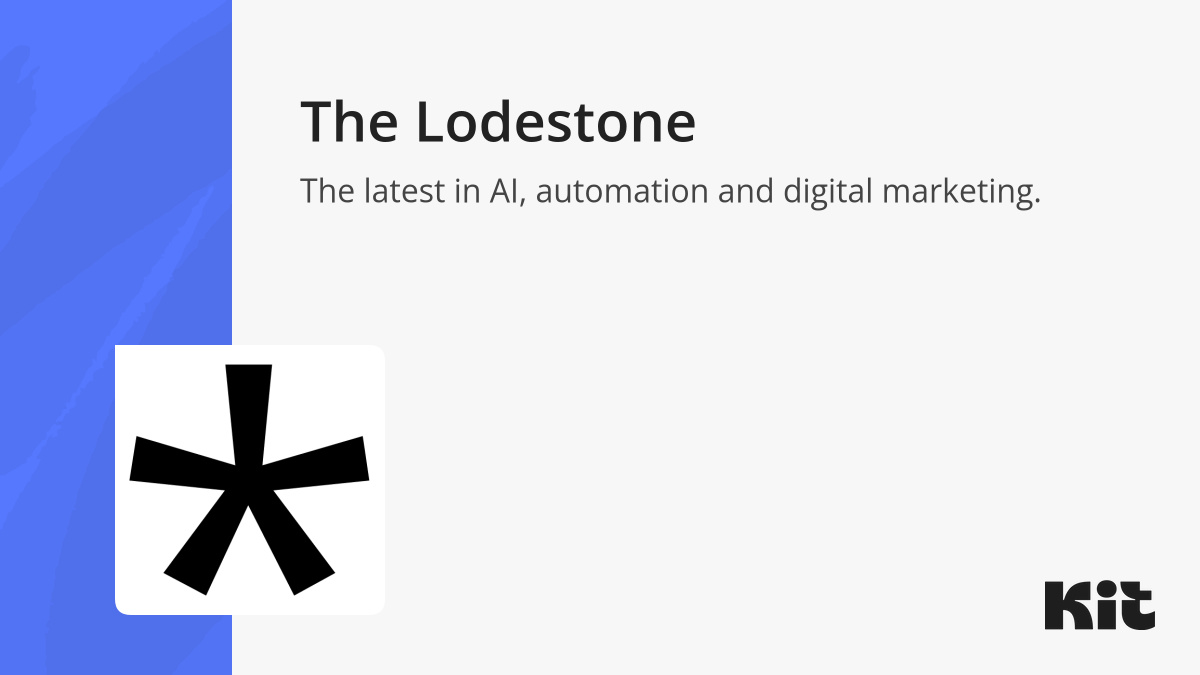
- Timing is still everything
I started off 2024 just writing about topics that interested me. This, of course, (and to nobody's surprise) didn't result in a lot of reads, views, clicks etc. The success of that AI coding Youtube video demonstrated that online success is determined not just by quality and content – it's determined first and foremost by timing.
That is not to say quality and the right content aren't necessary at all – they are the preconditions to being able to rise to the occasion. Showing up still counts, but doing the same thing over and over again hoping to strike online gold is like going to the casino. Yes it can happen, but your chances are slim.
It's also why I should have put the AI from scratch idea on hold when I got those initial market signals, rather than spend more time building a product for which I already knew the demand wasn't there.
That being said, as a small creator trend hacking is still one of the fastest ways to grow your reach, so I'll definitely be doing more of that in 2025.
- Better systems for content production
And in order to capitalise on viral moments you have to have content systems in place that let you leverage the tidal wave of online attention in an instant.
Even though I made a good start with automating parts of my content production this year, 2025 will see me automate more of my content production pipelines as AI models and AI tooling become more capable. This while making sure I continue to improve the relevance and quality of any piece of content I produce.
And I won't be doing this by building out SOPs (standard operating procedures), like the Hormozi's and the Gray's of this world recommend. I'll be investing heavily in AI agents to help me run my business.
- Courses conundrum
At the end of 2023 I made a decision not to enlist in Daniel Priestley's Key Person of Influence Accelerator, mainly because it cost GBP 10.000. I had a call with someone from Matt Gray's FounderOS program a couple of weeks ago, but will go into 2025 without a mentor again (for the same reason, it costs USD 7800).
I'm still struggling with this decision. Having a group of peers is wonderful, and not having to figure everything out yourself can speed things up a lot. I might reconsider at some point, but not until I've covered the costs with earnings online.
It's also hard to say beforehand. The one course I did take in 2024 was Gabe Bult's 5-hour Youtuber, which came in at EUR 475. Besides the courses and feedback from Gabe, this came with access to a wonderful community of fellow Youtubers on Skool that helped me a lot with feedback on thumbnails, titles and videos.
I probably wouldn't have spent 40 hours of my life integrating Payload CMS into a pointless React app had I taken that KPI accelerator early on. With this decision you're on your own though – there are some really valuable courses out there, but you'll probably get more value out of the community than from the course content.
Most of the content in these courses is available online for free.
The value of personal brands in 2025
There is an ongoing debate as to how valuable a personal brand actually is for your business. Unless you're selling online courses like most of the top-grossing content creators of 2024, does it actually help your business to build a presence online?
I personally think it does. A lot. As Tom Youngs pointed out in a recent video, the sales funnels that fuelled Hormozi's and Brunson's initial successes relied on cheap ads. Those ads are no longer cheap, and people are largely ignoring them anyway. Organic content is the future of media and marketing, whether you like it or not.
So if you haven't started building your online presence, I highly recommend you get started today. If you're a business owner looking to make sense of all of this, I'm more than happy to take a call and walk you through what this means for your business:
Bonus: My top 10 AI tools of 2024
- Claude 3.5 Sonnet: this has become my daily driver not just for coding, but also for ideation and content creation. I use it in a lot of my agents, as well as have it set as the default model in Perplexity Pro.
- Cursor IDE: I went all-in on AI coding in August of 2024 and haven't looked back since. The combination of Cursor + Claude 3.5 Sonnet has sped up my software development work enormously.
- GPT-4o: Not enough people were talking about the huge increases in speed and affordability that came with the GPT-4o release. It made a huge difference in the amount and type of enterprise workloads that could be automated with AI.
- Perplexity: I have a Pro subscription to Perplexity, after a ChatGPT Plus subscription in the beginning of 2024 and a Claude.ai sub later on I switched to Perplexity Pro in October and it has since become my daily driver for search and online research.
- Make.com (affiliate link): I'm building a lot of my content automation workflows in Make.com. It's so easy to use that it took me only 30m to get started, and it's already saved me countless hours copying and pasting AI generated stuff between different AI apps.
- Galileo AI: This is a design generation AI tool that helped me out a lot with the frontend design for both AI from scratch and client projects.
- Midjourney: I've had a Midjourney subscription on and off this year, and it's come a long way from Discord in terms of usability and image quality. Will be looking at alternatives for 2025, but it's helped me a lot with AI from scratch.
- LangChain: This has been my go-to AI agent orchestration framework, and along with LangGraph and more powerful LLMs I've been lucky enough to witness (and leverage!) the fast-improving reasoning capabilities of LLMs from a front-row seat.
- ChatGPT: This was a great tool when it first came out, and I even built a few custom GPTs including the infamous ChatKGB only available via private link. Haven't used it a lot of late, but will be running experiments with o1 soon.
- Gamma: This is an AI-powered presentation generation tool. It sped up the creation and quality of my AIgrunn talk slide deck a lot, and made me resent Powerpoint the next time I needed to do anything with it.









